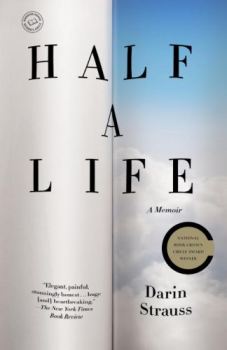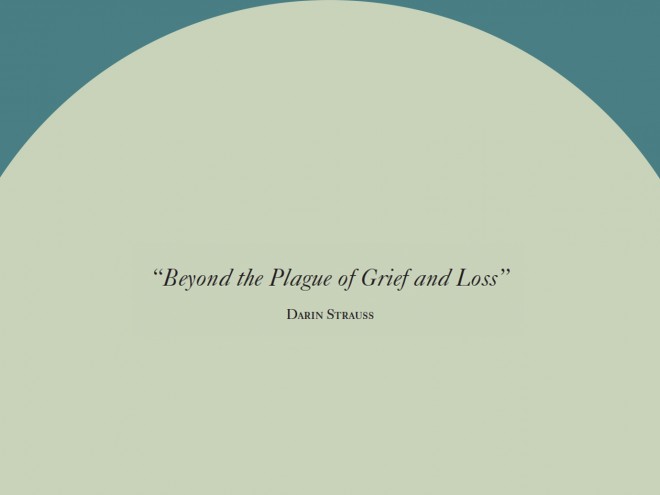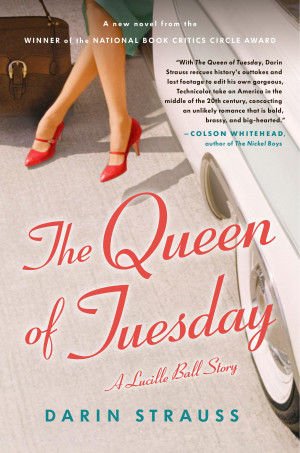Darin Strauss’s most recent book, Half a Life: A Memoir, is now available. He will be blogging all week for the Jewish Book Council and MyJewishLearning.
 Faith is a private issue. At least, I consider it to be one. (Try telling that to Tea Party evangelicals, though…) I consider myself a Jewish writer — even if my characters frequently are not Jewish — in the same way, I guess, that I consider myself a Jewish man, even though I don’t often attend shul.
Faith is a private issue. At least, I consider it to be one. (Try telling that to Tea Party evangelicals, though…) I consider myself a Jewish writer — even if my characters frequently are not Jewish — in the same way, I guess, that I consider myself a Jewish man, even though I don’t often attend shul.
In another post I’ll talk about my books (particularly Chang & Eng, a novel about the famous and Asian conjoined twins, and Half a Life, my non-fiction book about me). Here, today, I want to discuss faith.
I felt sheepish this week when I admitted to someone that I pray each night. My prayer is improvised — though like some standard jazz performance, the improv happens within pretty strict parameters — and asks for nothing. It wasn’t always this way.
I prayed every night for as long as I can remember — at least since my Israel bar-mitzvah some 27 years ago. But until recently I would ask G‑d for favors. Nothing extravagant, nor even of a material nature. But my prayer was a homemade mix of thanks and request. I didn’t use a standard, Jewish prayer-book prayer because 1) I don’t speak Hebrew, and 2) it seems to me that if one doesn’t know the meaning of what one is saying, that ignorance is an impenetrable barrier between oneself and G‑d. Now, I could’ve learned Hebrew, sure. But it seemed (and I’ll admit this may have been my laziness) that talking to G‑d directly was a better way of expressing my own personal feelings of belief and appeal and doubt and gratitude.
But recently, as my own comprehension of my faith increased, I realized there was much I didn’t believe. Or, not that I didn’t believe, exactly, but that I had serious doubts about a few things. For example, it struck me as unlikely that G‑d involves Himself with the daily minutiae of every single life on the planet. That an omnipotent creator of life would find himself shackled with that duty seemed improbable — it struck me as beneath Him. Also, how to explain the conflicting nature of some prayers? E.g., What to do when a million people pray for one thing, and another million its opposite? And what about not only the Holocaust, but every year’s untold tsunami and earthquake victims? Hadn’t they prayed? And sick children — etc.
All the same, I believe in G‑d, and also that Judaism is closest to what my conception of G‑d is — not to mention I have a steep cultural attachment to this religion and her people. And so I decided to keep on praying, but just not to ask G‑d for anything. The thing is, I truly am profoundly thankful to G‑d for all the blessings I have received in my life, beginning with the gift of Life itself. Now, whether my not asking for good things to happen to me is subconsciously intended to win me brownie points with G‑d is something I can’t answer. But I do feel the need to give thanks, and also not to feel hypocritical by asking for things when I have doubts that G‑d would answer me.
That is not to say I haven’t broken my little rule; that I haven’t taken up the mantle of hypocrisy now and again. But I do so for my 3‑year-old son. (He has been diagnosed with Rheumatoid Arthritis, and I have prayed, and will continue to pray, for his health and comfort.) It seems to me a little hypocrisy in the service of fatherhood may get a bit of a divine pass. But who knows.
This homemade ritual feels right for me; I’m not saying anyone else should embrace it. I hope others would give me the same wide faith devotional birth.
Darin Strauss is the author of Half a Life, More Than It Hurts You
, Chang and Eng
, and The Real McCoy
. He will be blogging here all week.
Darin Strauss’s most recent book, The Queen of Tuesday, came out in August 2020 and was a Washington Post best book of the year, among others. He’s also the author of the bestselling novels Chang & Eng, The Real McCoy, More Than It Hurts You, the NBCC-winning memoir Half a Life, and a bestselling comic-book series, Olivia Twist. These have been New York Times Notable Books; and Newsweek, Los Angeles Times, San Francisco Chronicle, Amazon, Chicago Tribune and NPR Best Books of the Year, among others.
The recipient of a Guggenheim Fellowship, a National Book Critics Circle Award, an American Library award, and numerous additional prizes, Strauss has been translated into fourteen languages and published in nineteen countries. In addition, Darin has collaborated on screenplays with Gary Oldman and Julie Taymor, and is a Clinical Professor of Fiction at New York University. He is currently a finalist for the Joyce Carol Oates Award.



